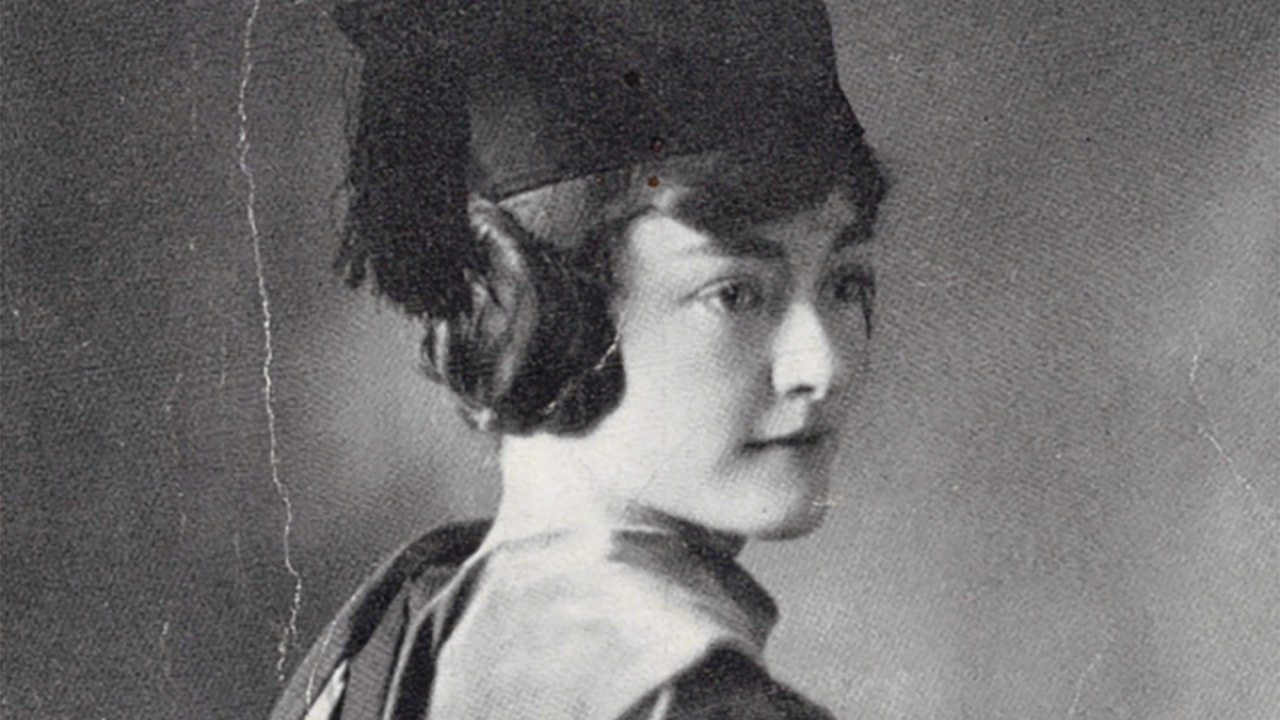
Celeste Turner Wright: Longest-serving Chair of English
Celeste Turner Wright was first recruited to Davis in 1928 at the age of 22 to chair English, Ph.D. in hand from UC Berkeley. She was one of only two faculty in what was then called the Division of English, and the first Ph.D. faculty member hired in the humanities. Davis at that time was the University Farm Annex of UC Berkeley, with approximately 350 students, many of them non-degree students, 342 of them male and 8 female, according to Wright.
She was told when she was hired that she was chosen for the position in part “to be a refining influence on the farm boys,” as she put it in her oral history, a copy of which resides in the English department library. Celeste went on to chair the department for 27 years, until 1955. There would not be another woman named chair of the department until 1998, 43 years later, when yours truly, Linda Morris, became chair.
Celeste Turner graduated from high school in Pasadena at the age of 14 and graduated from UCLA (then called Southern Branch) when she was only 19. She was the youngest person to earn a Ph.D. from the Berkeley English department, publishing her dissertation, “Anthony Mundy, an Elizabethan Man of Letters,” within six months of receiving her degree. When she arrived at Davis she initially lived in a small dormitory with a few co-eds, plus female “stenographers, librarians, technicians, and even public-school teachers.”
She was asked out to dances by male students, and even did some inviting of her own, but was quick to point out in her memoir that she asked the head of the campus, Dr. Howard, for permission to date students. He replied, “A girl has to go somewhere. Our men take out the public-school teachers.” Several years later she also “squared it with Dr. Howard” to marry one of her students, Vedder Wright, who had taken five courses from Celeste and was four years her junior. She told Dr. Howard that she’d remain single if marrying Vedder meant she would get fired. Their engagement, in 1933, made headlines in a San Francisco newspaper: “PROF TO WED PUPIL.”
The department faculty grew in numbers substantially during her time as chair. In 1935-36, the second and third female Ph.D. faculty members were hired, and the fourth in 1937. During these early days, with all classes at the lower division, it was believed “that no male Ph.D. worth his salt” would agree to teach only lower division courses. So for a period a significant number of English faculty members were women, most with Ph.D degrees. That number, however, declined in the 1960s and would not re-surge again until the late 1990s, while today the numbers stand at sixteen senate faculty women and thirteen faculty men.
In 1939, according to Celeste’s memoir, all promotions in the department were handled by UC Berkeley or, as she stated, “by a bunch of strangers.” It was not until 1948 that the Davis English department offered any upper division courses and at least until then all members of the faculty taught Subject A as part of their teaching responsibilities. It was not until 1952 that the department offered a major in English and not until 1959 that it offered a M.A. degree. Here again Berkeley had a say over what happened in the department, for it is reported in Celeste’s memoir that in 1956 UC Berkeley refused to allow Davis English to offer the M. A. degree.
A significant moment in Celeste’s professional life was also connected directly to the Berkeley English department, for in 1940 she met Josephine Miles, who was five years younger than Celeste but became her unofficial advisor. Jo Miles was already an accomplished, published poet when she and Celeste met, and she advised her on places where she might publish her own poems. (Jo was the first woman faculty member in English at Berkeley.)
Between 1941 and 1963, Celeste Turner Wright published 87 poems in national publications, according to the Faculty Research Lectureship report. She also published a number of books of poetry, including A Sense of Place, which according to her obituary won a Commonwealth Club of California medal. Ultimately, she endowed the Celeste Turner Wright poetry award in conjunction with the American Academy of Poetry. She was tenured in 1941 and promoted to full professor in 1948.
Celeste resigned as chair in 1955 over a dispute within the department concerning the salary offered to a new faculty member. While Celeste blamed herself in part for the dispute and attempted to apologize to her colleagues, “they were all determined to scold me publicly. And they did it.” By the spring, she said, “our department was again closely knit,” but she was not sorry she had resigned. The benefit to Celeste? “During the next eight years I published more than I’d done in the previous twenty-seven.”
In 1962 Celeste was named the campus Faculty Research Lecturer, the first person so honored in the humanities. In 1975 she was appointed as the Marshall for Picnic Day, an honor that was repeated in 1998. She retired from the faculty in 1979 and lived for twenty more years. Celeste Turner Wright died in 1999 at the age of 93.
In 1997, the Dramatic Art Building was renamed in Wright's honor. Today, Wright is remembered in the English Department's annual Celeste Turner Wright Poetry Prizes. In
Read the original version at the Department of English.
